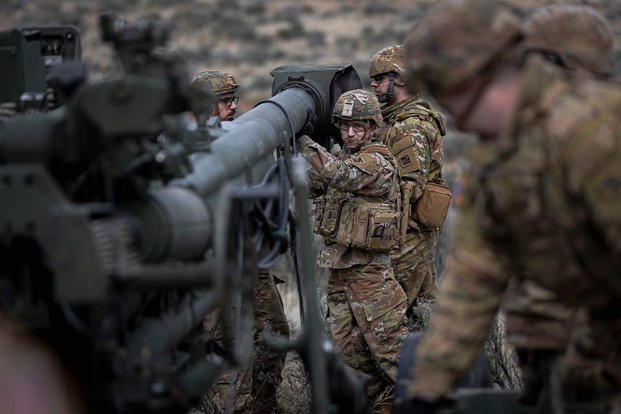The National Guard is behind paying at least 9,000 soldiers the bonuses they were promised for signing up, according to a service component source with direct knowledge of the situation, with some soldiers and their families telling Military.com that payments have been missing for years.
The delays are so severe that Guard officials are tracking an additional 3,900 soldiers who completed their service and left the military without getting any bonus payment, though some may have lost eligibility.
"I was really relying on this money to help with moving into a new place with my wife," one soldier said, while explaining that the first half of his $20,000 enlistment bonus was a year overdue. "I did my end of things, and this is a really bad introduction to the Army, not taking care of people."
The bonuses are a key part of the Army National Guard's pitch: Do part-time service and the occasional deployment in exchange for many of the benefits tied to serving in the military. Hefty enlistment bonuses, often as high as $20,000, are meant to sweeten the deal.
Soldiers are typically supposed to receive the first payment of their enlistment bonuses after completing initial service training. The National Guard considers payments late if more than 30 days have elapsed since training was completed and no payment has been made. But that 30-day goal is not codified in any policy, leaving soldiers with little recourse to raise complaints when payments are overdue. Bonuses are usually paid out in chunks, with the second half being disbursed halfway through soldiers' first contracts.
"While nearly 94% of our Soldiers eligible to receive an enlistment bonus have received it, we are working very hard to reconcile the remaining 6% because we hold ourselves to higher standards and believe one overdue payment to an otherwise eligible Soldier is one too many," Col. Danielle MacDonnell, division chief, Army National Guard G1 operations, told Military.com in a statement.
The average time for receiving the first payment for a bonus is six months, Guard officials tell Military.com, though soldiers and families have reported that it can take years.
The issue, according to officials, is the accumulated effect of undermanned, poorly trained or poorly performing full-time staff working with a payment-processing system that has faced multiple long-term catastrophic outages. That's meant staff members have had to repeatedly track and process payments manually.
The Army National Guard Incentive Management System, or GIMS, was first rolled out in 2012, allowing states to manage and monitor incentives. It was designed to streamline the process and mitigate fraud and abuse.
But the system crashed in late 2018 and was inoperable for about 10 months; another 10-month outage occurred in 2021. While the system was down, bonuses had to be filed through a complicated manual process, creating a backlog that states are still trying to fix.
"GIMS created some challenges for us," one Guard official said. "Over the last couple of years, we've gotten through many of those hurdles, but it has attributed [sic] to overdue bonus payments."
Two adjutants general, top commanders in their respective states, described discovering their staff tracking enlistment bonuses on dry-erase boards or through email traffic and handwritten notes. In some cases, top brass became aware of the problem through soldiers using the so-called open door policy -- skipping the chain of command to report issues. Some soldiers have escalated their issues through complaints to their representatives in Congress.
About a year ago, the National Guard Bureau stood up incentive oversight teams that try to fix some of the issues at the state level, though correcting the problems will likely take years.
The bulk of Guard soldiers are part-time, and in many cases do not have easy access to the staff who could help fix bonus problems. Those junior enlisted soldiers are also often unfamiliar with the bureaucracy of the National Guard and, therefore, unaware how to properly follow up on payment issues.
Full-time Guard staff are frequently mid-ranking soldiers, often required to perform a range of tasks unrelated to their original job. For example, an infantryman looking for a full-time job in the Guard might find themselves in an administrative role. But juggling the multiple clunky online systems that the Guard relies upon comes with a steep learning curve, and some states have struggled to track work by full-time staff.
Several soldiers told Military.com that these staff members performing administrative functions claimed the state was out of money, pointing to expensive training events like Combat Training Center rotations. However, the money for benefits is centralized and not impacted by any respective budgets on the state level.
"There is frankly a lot of misinformation on the [unit] level. It isn't their fault, and it's something I'm trying to fix," one state's adjutant general told Military.com on the condition of anonymity to avoid retaliation. "The soldiers are frustrated. Of course … why would they stick around? Sometimes people have been lazy too. The soldier shouldn't be coming to us … for their money. We should just pay our bills on time."
The National Guard has a rocky history with accurately administering enlistment bonuses. During the peak of the wars in Afghanistan and Iraq, the California National Guard sought recoupment of $195 million in enlistment bonuses issued in error from more than 17,000 troops, including some who were wounded in combat, marking one of the largest incentives-related scandals in the past decade.
A report from the Government Accountability Office found that California had been handing out bonuses higher than what was authorized in the budget. That misuse of funds is what spurred GIMS to be built.
The California National Guard's incentives manager, Master Sgt. Toni Jaffe, was sentenced to 30 months in prison in 2012 and ordered to pay $15 million. She admitted in court to routinely fudging information on Guard members to juice up bonuses because she said she felt pressure to fulfill recruiting quotas.
The years-long recoupment process drew the ire of congressional leadership, which scrambled for legislative solutions until the Pentagon eventually waived the debt and let those Guardsmen keep their bonuses and reimbursed those who had paid them back.
Soldiers who have been out of the Army National Guard for more than a year can submit a claim for unpaid bonuses at this link.
-- Steve Beynon can be reached at Steve.Beynon@military.com. Follow him on Twitter @StevenBeynon.
Related: Army Reserve Education Benefits Collapse Halts Fall Semester Enrollments













